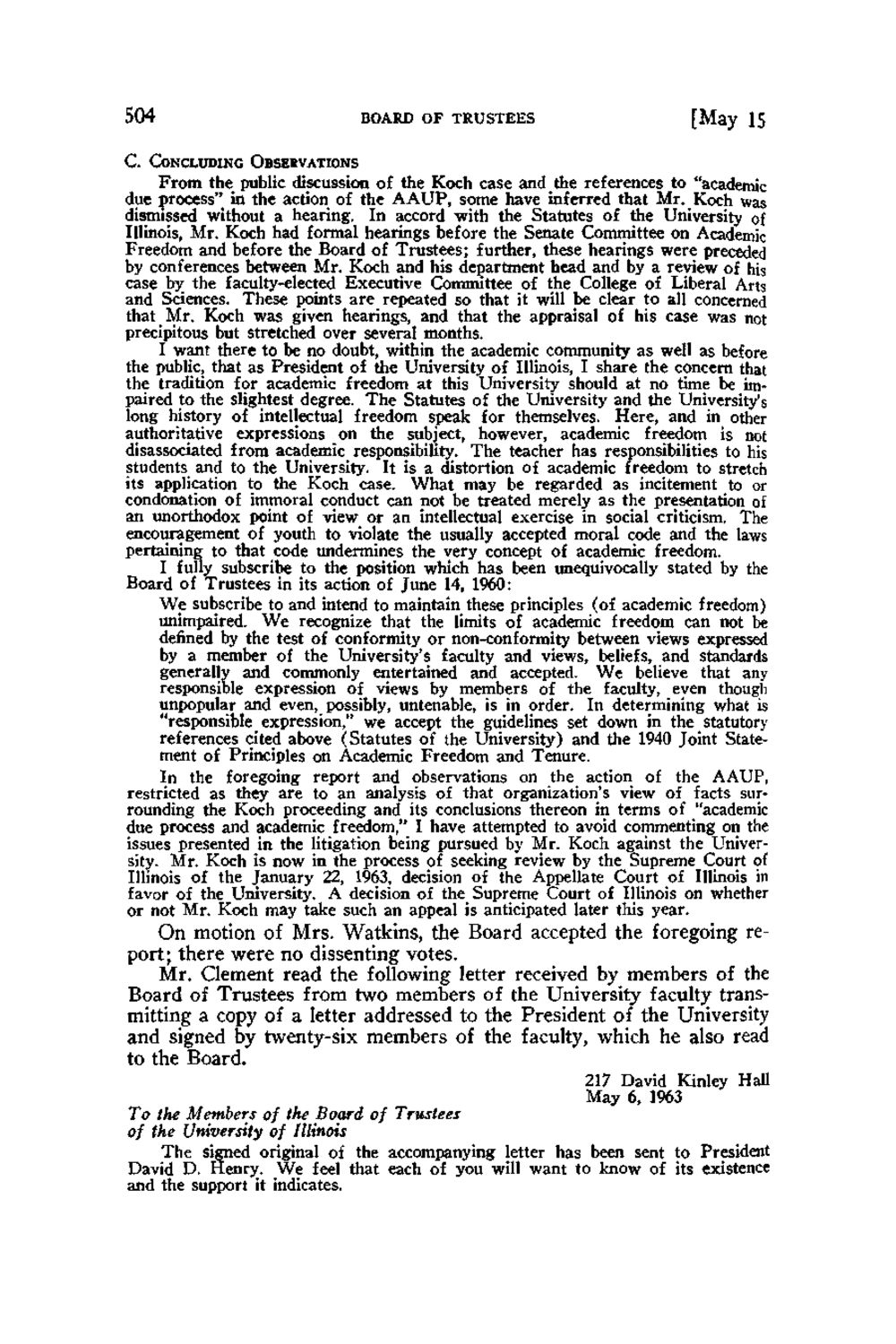| |
| |
Caption: Board of Trustees Minutes - 1964
This is a reduced-resolution page image for fast online browsing.

EXTRACTED TEXT FROM PAGE:
504 C. CONCLUDING OBSERVATIONS BOARD OF T R U S T E E S [May 15 F r o m the public discussion of the Koch case and the references to "academic due process" in the action of the A A U P , some have inferred that Mr. Koch was dismissed without a hearing. In accord with the Statutes of the University of Illinois, Mr. Koch had formal hearings before the Senate Committee on Academic Freedom and before the Board of Trustees; further, these hearings were preceded by conferences between Mr. Koch and his department head and by a review of his case by the faculty-elected Executive Committee of the College of Liberal Arts and Sciences. These points are repeated so that it will be clear to all concerned that Mr. Koch was given hearings, and that the appraisal of his case was not precipitous but stretched over several months. I want there to be no doubt, within the academic community as well as before the public, that as President of the University of Illinois, I share the concern that the tradition for academic freedom at this University should at no time be impaired to the slightest degree. The Statutes of the University and the University's long history of intellectual freedom speak for themselves. Here, and in other authoritative expressions on the subject, however, academic freedom is not disassociated from academic responsibility. The teacher has responsibilities to his students and to the University. It is a distortion of academic freedom to stretch its application to the Koch case. W h a t may be regarded as incitement to or condonation of immoral conduct can not be treated merely as the presentation of an unorthodox point of view or an intellectual exercise in social criticism. The encouragement of youth to violate the usually accepted moral code and the laws pertaining to that code undermines the very concept of academic freedom. I fully subscribe to the position which has been unequivocally stated by the Board of Trustees in its action of June 14, 1960: We subscribe to and intend to maintain these principles (of academic freedom) unimpaired. W e recognize that the limits of academic freedom can not be denned by the test of conformity or non-conformity between views expressed by a member of the University's faculty and views, beliefs, and standards generally and commonly entertained and accepted. W e believe that any responsible expression of views by members of the faculty, even though unpopular and even, possibly, untenable, is in order. In determining what is "responsible expression," we accept the guidelines set down in the statutory references cited above (Statutes of the University) and the 1940 Joint Statement of Principles on Academic Freedom and Tenure. In the foregoing report and observations on the action of the AAUP, restricted as they are to an analysis of that organization's view of facts surrounding the Koch proceeding and its conclusions thereon in terms of "academic due process and academic freedom," I have attempted to avoid commenting on the issues presented in the litigation being pursued by Mr. Koch against the University. Mr. Koch is now in the process of seeking review by the Supreme Court of Illinois of the January 22, 1963, decision of the Appellate Court of Illinois in favor of the University. A decision of the Supreme Court of Illinois on whether or not Mr. Koch may take such an appeal is anticipated later this year. On motion of Mrs. Watkins, the Board accepted the foregoing report; there were no dissenting votes. Mr. Clement read the following letter received by members of the Board of Trustees from two members of the University faculty transmitting a copy of a letter addressed to the President of the University and signed by twenty-six members of the faculty, which he also read to the Board. 217 David Kinley Hall May 6, 1963 To the Members of the Board of Trustees of the University of Illinois T h e signed original of the accompanying letter has been sent to President David D. Henry. W e feel that each of you will want to know of its existence and the support it indicates.
| |